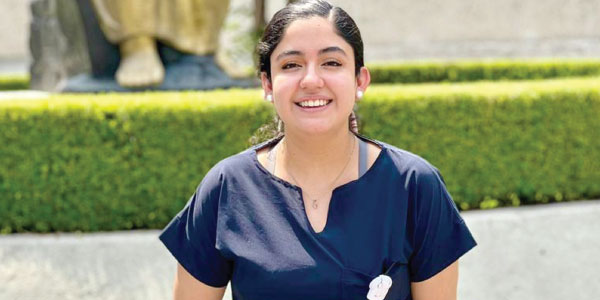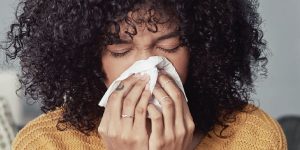
By Tere Siqueira
A person has only one body and needs to take care of it.
That’s the advice from Dr. Jackelina Gutierrez, M.D., one of the women gracing the pages of Dos Mundos in March, also designated as Women’s History Month. The newspaper presents the following transcript of a recent interview with Gutierrez, who graduated from medical school in Mexico:
Dos Mundos: Why is it important for people to have a regular sleep routine?
Jackelina Gutierrez: Rest is crucial. To sleep well and really get a good night’s sleep, you must have a routine before bedtime. This means not using the cell phone, not watching TV or other sources of bright lighting.
Follow the same steps every night. Do not eat, (but) wash your face, brush your teeth, put on your pajamas, go to bed and so on every night. In other words, a super-super-structured routine. And go to the bathroom earlier, so you don’t have to get up to pee at night. Also, being well-hydrated (is important), so that your repair processes in the body are carried out successfully.
DM: Are melatonin and CBD good alternatives to help people rest?
JG: Melatonin is a sleep-inducer. It doesn’t put you to sleep; it makes you sleepy. CBD, it has some positive properties, some negative ones. It is being studied a lot and many articles are coming out. The evidence says that it is good as a sleep-inducer or to help you as a sleep aid. But also, since it is a bit new, the collateral or long-term effects, have not yet been studied. So its use is still a bit controversial.
DM: What is elementary in people’s routine to lead a healthier life?
JG: Hydration. There are calculators that tell you how much water you have to drink according to you – your age, your weight and your height. Obviously, the recommended amount is 2 liters, but there are people who may have less requirements and that’s fine.
Also, the diet, basically, it is necessary to maintain a diet that contains all the food groups, because each one has … nutrients that are essential and skipping one also implies the risk of getting sick or that your body malfunctions. For example, fats. Although people usually say, “I will avoid them because they are bad,” well, no. I mean, they really help us in physical processes. Well, basically, it is not to have excesses and to maintain a balanced diet.
DM: Do people really need to take vitamins?
JG: Well, vitamins are not really needed, unless you have a proven vitamin deficiency. There are certain vitamins that certain groups of people lack – for example, B12 in diabetics, which helps various processes. Vitamin D is supposed to help us, … because we are more sedentary and spend more time indoors and less time in the sun. It also helps regulate the metabolism of many, many things, such as thyroid and bones. So really, the vitamins that you don’t need, you end up eliminating them through the kidneys.
In the end, you make your body work harder. Also, you can have toxic doses of some vitamins. For example, vitamin A can affect your eyesight and vitamin K can interfere with your body’s clotting processes.
DM: How often is a medical checkup recommended?
JG: In general, every year. People who are 40 years old or older start to have some deficiencies or some diseases, and it is important to have them screened. It is important to do the studies to be able to diagnose in time diseases such as diabetes, anemia, high uric acid or cholesterol. This is especially important, so that it does not generate long-term complications.
DM: How does stress affect health?
JG: I think each person has his or her own triggers, but I think it is the management of emotions many times and setting limits both to others and to oneself. The stress hormone is cortisol, and when it goes up, it goes to certain parts of the body, especially the target organs. For example, the heart. That happens, for example, with heart attacks. Also, the psychiatric part, which in the end also generates an imbalance in the neurological hormones.
DM: How can you prevent stress from affecting your health?
JG: By doing physical activity or channeling those emotions in some way. Exercising generates endorphins, and somehow, your body releases stress. But it can also be other things. Having a hobby. Everyone has their own hobby and it is important to prioritize it. Sometimes, we are too caught up in our routine or … in what we have to do. Whether it’s work, school or kids, … sometimes we put aside those things that are also healthy.
Entrevista: Dr Jackelina Gutiérrez
Una persona sólo tiene un cuerpo y debe cuidarlo.
Ese es el consejo de la doctora Jackelina Gutiérrez, una de las mujeres que engalanan las páginas de Dos Mundos en marzo, también designado Mes de la Historia de la Mujer. El periódico presenta la siguiente transcripción de una entrevista reciente con Gutiérrez, licenciada en Medicina en México:
Dos Mundos: ¿Por qué es importante que la gente tenga una rutina de sueño regular?
Jackelina Gutiérrez: El descanso es fundamental. Para dormir bien y realmente tener un sueño reparador, hay que tener una rutina antes de acostarse. Esto significa no usar el móvil, no ver la televisión ni otras fuentes de luz brillante. Sigue los mismos pasos cada noche. No comas, (pero) lávate la cara, cepíllate los dientes, ponte el pijama, vete a la cama y así todas las noches. En otras palabras, una rutina super super estructurada. Y ve al baño antes, para no tener que levantarte a orinar por la noche. Además, estar bien hidratado (es importante), para que tus procesos de reparación en el cuerpo se lleven a cabo con éxito.
DM: ¿Son la melatonina y el CBD buenas alternativas para ayudar a la gente a descansar?
JG: La melatonina es un inductor del sueño. No te duerme; te da sueño. El CBD tiene algunas propiedades positivas y otras negativas. Se está estudiando mucho y están saliendo muchos artículos. La evidencia dice que es bueno como inductor del sueño o para ayudarte a dormir. Pero también, como es un poco nuevo, los efectos colaterales o a largo plazo, todavía no se han estudiado. Así que su uso sigue siendo un poco controversial.
DM: ¿Qué es elemental en la rutina de la gente para llevar una vida más sana?
JG: La hidratación. Hay calculadoras que te dicen cuánta agua tienes que beber en función de ti: tu edad, tu peso y tu altura. Obviamente, la cantidad recomendada es de 2 litros, pero hay gente que puede tener menos necesidades y no pasa nada. Además, la dieta, básicamente, es necesario mantener una dieta que contenga todos los grupos de alimentos, porque cada uno tiene… nutrientes que son esenciales y saltarse uno también implica el riesgo de enfermar o que tu cuerpo funcione mal. Por ejemplo, las grasas. Aunque la gente suele decir: «Las evitaré porque son malas», pues no. Es decir, realmente nos ayudan en los procesos físicos. Bueno, básicamente es no tener excesos y mantener una dieta equilibrada.
DM: ¿Es realmente necesario tomar vitaminas?
JG: Bueno, las vitaminas no son realmente necesarias, a menos que se tenga una carencia vitamínica demostrada. Hay ciertas vitaminas de las que carecen determinados grupos de personas; por ejemplo, la B12 en los diabéticos, que ayuda a diversos procesos. Se supone que la vitamina D nos ayuda, … porque somos más sedentarios y pasamos más tiempo dentro de casa y menos en el sol. También ayuda a regular el metabolismo de muchas, muchas cosas, como la tiroides y los huesos. Así que realmente, las vitaminas que no necesitas, las acabas eliminando a través de los riñones.
Al final, haces que tu cuerpo trabaje más. Además, puedes tener dosis tóxicas de algunas vitaminas. Por ejemplo, la vitamina A puede afectar a la vista y la vitamina K puede interferir en los procesos de coagulación del organismo.
DM: ¿Con qué frecuencia se recomienda un chequeo médico?
JG: En general, cada año. Las personas que tienen 40 años o más empiezan a tener algunas deficiencias o algunas enfermedades, y es importante hacerles estudios. Es importante hacer los estudios para poder diagnosticar a tiempo enfermedades como la diabetes, la anemia, el ácido úrico alto o el colesterol. Esto es especialmente importante, para que no genere complicaciones a largo plazo.
DM: ¿Cómo afecta el estrés a la salud?
JG: Creo que cada persona tiene sus propios desencadenantes, pero creo que es la gestión de las emociones muchas veces y poner límites tanto a los demás como a uno mismo. La hormona del estrés es el cortisol, y cuando sube, va a determinadas partes del cuerpo, sobre todo a los órganos blanco. Por ejemplo, el corazón. Eso ocurre, por ejemplo, con los infartos. También la parte psiquiátrica, que al final también genera un desequilibrio en las hormonas neurológicas.
DM: ¿Cómo se puede evitar que el estrés afecte a la salud?
JG: Haciendo actividad física o canalizando esas emociones de alguna manera. Hacer ejercicio genera endorfinas y, de alguna manera, tu cuerpo libera estrés. Pero también pueden ser otras cosas. Tener un hobby. Cada uno tiene su afición y es importante priorizarla. A veces, estamos demasiado atrapados en nuestra rutina o… en lo que tenemos que hacer. Ya sea el trabajo, la escuela o los niños, … que dejamos de lado esas cosas que también son saludables.









